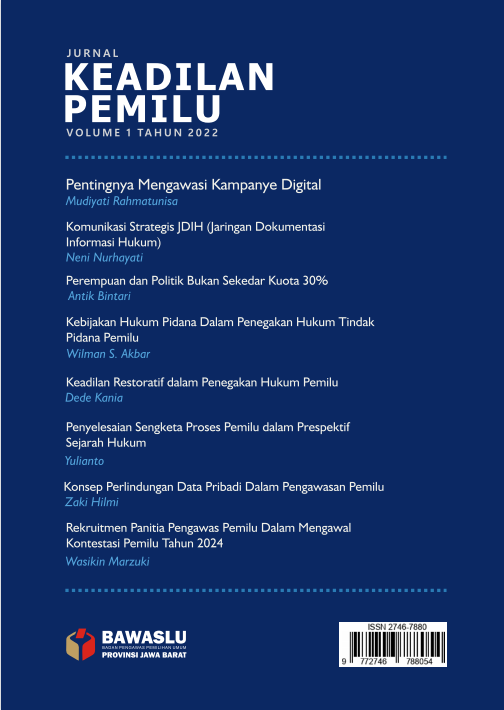PENTINGNYA MENGAWASI KAMPANYE DIGITAL
DOI:
https://doi.org/10.55108/jkp.v3i1.268Kata Kunci:
campaign, digital campaign, social media, campaign oversightAbstrak
Advances in information and communication technology (ICT) have brought about signicant changes in the conduct of electoral campaigns. The campaign has incorporated online elements with the potential to reach a wider range of constituents and in a very fast time. However, at the same time, the use of digital campaigns also brings with it negative practices which ultimately threaten the integrity of the campaigns. This paper discusses a number of factors that underlie the importance of monitoring digital campaign activities which have now become a strategic alternative for election contestants in order to gain votes. This paper also discusses how digital campaign oversight can be carried out effectively. This study uses qualitative research method with literature studies to discuss in depth various rationales regarding the importance of digital campaigns to be monitored and effective forms of oversight to be able to realize fair and equal campaigns as an important basis for democratic elections. The study of literature is used as the data collection technique. Oversight of digital campaigns is very strategic because of a number of potential negative effects of manipulative practices that threaten the fundamental aspects of democratic campaigns, namely the right of voters to obtain valid and reliable information, as well as an equal level of playing eld for all election contestants. To realize these fundamental aspects, oversight of digital campaigns requires a conducive legal framework, supportive legislative institutions, capable monitoring and supervisory bodies, political parties that adhere to campaign norms and ethics, and constructive cooperation with social media platform owners. Keywords: Campaign,
Referensi
aceproject.org. “Electoral Campaign.” ACE Encyclopedia. https://aceproject.org /main/english/ei/eie09.htm.
Arianto, Bambang. “Kampanye Kreatif Dalam Kontestasi Presidensial 2014.” Jurnal Ilmu Sosial dan Ilmu Politik 19, no. 1 (2016).
Carter, Nancy, Denise Bryant-Lukosius, Alba Dicenso, Jennifer Blythe, and Alan J. Neville. “The Use of Triangulation in Qualitative Research.” Oncology Nursing Forum 41, no. 5 (September 1, 2014): 545547.
Diamond, Larry. “Liberation Technology.” Journal of Democracy 21, no. 3 (2010): 6983.
Hill, David T., and Krishna Sen. The Internet in Indonesias New Democracy (Asias Transformations/Asia.Com). New York: Routledge, 2005. Accessed December 28, 2 0 2 2 . http://www. ama zon. com/Int e rne t-Indone s i a s -Democ r a cyTransformations-Asia-com/dp/041528564X.
Hirzi, Aziz Tauk. “Merancang Kampanye Pemilu.” Mediator: Jurnal Komunikasi 5, no. 1 (2004).
International IDEA. Protecting Political Campaigns from Digital Threats: Insights from Tunisia, Panama and Bolivia. Stockholm, 2020. Accessed December 28, 2022. https://www.idea.int/sites/default/les/publications/protecting-politicalcampaigns-from-digital-threats.pdf.
Krasodomski-Jones, Alex, Josh Smith, Elliot Jones, Ellen Judson, and Carl Miller. “Warring Songs: Information Operations in the Digital Age.” Demos (2019).
Norris, Robert, and Patrick Merloe. Media Monitoring to Promote Democratic Election: An NDI Handbook for Citizen Organizations . Washington, D.C: National Democratic Institute for International Affairs (NDI), 2002.
Persily, Nathaniel. “Can Democracy Survive the Internet? .” Journal of Democracy 28, no. 2 (2017): 6376.
Schutt, Russell K. “Qualitative Data Analysis.” In Investigating the Social World, 320357. 7 t h e d . T h o u s a n d O aks , C A : S A G E P u b l i c a t i o n s , I n c . , 2 0 1 2 . http://jefftirsheld.com/wp-content/uploads/2017/12/Investigating-the-SocialWorld_Schutt.pdf.
Siregar, Fritz Edward. “Mengawasi Media Sosial Dalam Proses Pemilu 2019.” In Perilah Penyelenggaraan Kampanye, edited by Dede Sri Kartini, 171199. Jakarta: Bawaslu RI, 2019.
The OSCE/ODIHR. Guidelines for Observation of Election Campaigns on Social Networks. Warsaw: The OSCE Ofce for Democratic Institutions and Human Rights (ODIHR), 2021.
The OSCHE/ODIHR. Handbook for the Observation of Election Campaigns and Political Environments. Warsaw: The OSCE Ofce for Democratic Institutions and Human Rights (ODIHR), 2021.
Tucker, Joshua A, Andrew Guess, Pablo Barberá, Cristian Vaccari, Alexandra Siegel, Sergey Sanovich, Denis Stukal, and Brendan Nyhan. Social Media, Political Polarization, and Political Disinformation: A Review of the Scientic Literature. Menlo Park, CA, 2018. Accessed December 29, 2022. https://www.hewlett.org/wp- content/uploads/2018/03/Social-Media-Political-Polarization-and-PoliticalDisinformation-Literature-Review.pdf.
Utz, Sonja. “The (Potential) Benets of Campaigning via Social Network Sites.” Journal of Computer-Mediated Communication 14, no. 2 (2009): 221243.
Unduhan
Diterbitkan
Cara Mengutip
Terbitan
Bagian
Lisensi
Hak Cipta (c) 2022 Mudiyati Rahmatunnisa

Artikel ini berlisensi Creative Commons Attribution 4.0 International License.




